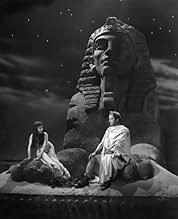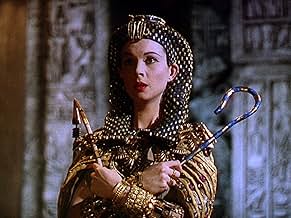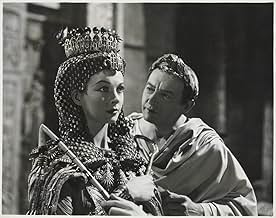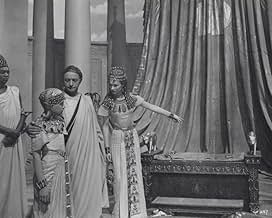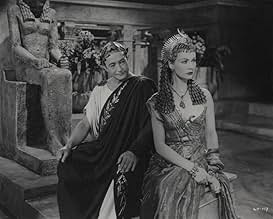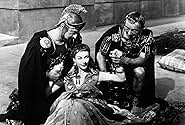Alors que les romains envahissent lEgypte, Jules César découvre une jeune princesse cachée à proximité du Sphinx. Il s'agit de la ravissante Cléopâtre. Impressionné par son charme et son car... Tout lireAlors que les romains envahissent lEgypte, Jules César découvre une jeune princesse cachée à proximité du Sphinx. Il s'agit de la ravissante Cléopâtre. Impressionné par son charme et son caractère, le redoutable conquérant est déterminé à faire d'elle une reine.Alors que les romains envahissent lEgypte, Jules César découvre une jeune princesse cachée à proximité du Sphinx. Il s'agit de la ravissante Cléopâtre. Impressionné par son charme et son caractère, le redoutable conquérant est déterminé à faire d'elle une reine.
- Nommé pour 1 oscar
- 2 nominations au total
- Achillas
- (as Antony Eustrel)
- 2nd. Centurion
- (as James Mc Kechnie)
Avis en vedette
The film was certainly expensive by the standards of 1945; indeed, it was reported to be the most expensive film ever made in Britain at that date, costing well over a million pounds. It is not, however, a Hollywood-style epic but a cinematic adaptation of the play by George Bernard Shaw. While in the Egyptian capital city of Alexandria, Julius Caesar becomes involved in a power-struggle between Queen Cleopatra and the backers of her younger brother (and husband) Ptolemy. In real life Caesar and Cleopatra were lovers, but here their relationship is portrayed not as a romantic or a sexual one. The middle-aged Caesar is shown more as a father-figure to the youthful Cleopatra, a mentor who tutors her in the arts of politics and government. (And, given the intrigue-ridden nature of the Egyptian court, these are certainly areas where she could do with a little tuition).
Towards the end of his long life- this film was made five years before his death- Shaw was a revered figure of English literature, regarded as the nearest thing the twentieth century had produced to a Shakespeare. In more recent years this reputation has faded somewhat, partly because his plays are not always very dramatic. He can be stronger on philosophy and political theory than on action or dramatic tension, and even though his contributions to political and philosophical debates are often expressed in witty and vivid dialogue, the reader (and to an even greater extent the theatre-goer) is sometimes left with the impression that Shaw's linguistic gifts might have been better employed in penning political tracts than in writing for the stage.
Nevertheless, some of Shaw's plays have been turned into very good films, notably the 1938 "Pygmalion" with Leslie Howard and Wendy Hiller, or the 1941 "Major Barbara", also with Hiller and Robert Morley. (One could also include "My Fair Lady" in this list, but that is really second-hand Shaw, a musical based upon "Pygmalion" which owes much of its success to its songs). There have, unfortunately, also been a number of failures, such as "The Millionairess", which relied too heavily on Sophia Loren's glamour and the comic talents of Peter Sellers (which were not too much in evidence) and, although supposedly a comedy, ended up about as funny as a two-hour speech at a TUC conference.
"Caesar and Cleopatra" must also rank among the less successful Shaw adaptations. A lot of its million-pound-plus budget seems to have been spent on its lavish sets- economic and political considerations in 1945 precluded location shooting in Egypt itself- but from a modern perspective they seem like part of the problem, giving the whole production a very artificial, stagey look. It is said that the director Gabriel Pascal ordered sand from Egypt to get the colour right, but when everything else looks so artificial a gesture like that seems like an unnecessary luxury. The stagey impression is strengthened by the dialogue, both in the unnatural way it is spoken and, at times, in the way it is written. (Shaw could sometimes succumb to the delusion that if he was the twentieth-century Shakespeare it was incumbent on him to write in the style of his august predecessor, particularly when dealing with historical subjects).
The best acting performance comes from Claude Rains as Caesar. (I normally think of Rains as a supporting actor in roles like his French police chief in "Casablanca", so it was nice to see him in a leading role for once). This is not the Caesar of history, who was doubtless a lot more ruthless than he is portrayed here, but it is Caesar as Shaw wrote him, an essentially decent man whose undoubted sense of Realpolitik is tempered by his instincts towards humanity and clemency.
Vivien Leigh, however, is well below her best here. She may have been one of Britain's leading actresses of the period, but seems quite wrong for the part. She was 32 at the time, and never seems convincing as Cleopatra, whom Shaw envisaged as a kittenish teenager. A thirty-something Cleopatra would not, I am sure, have required any lessons from Caesar in statecraft.
Of the supporting cast, the best is Francis L. Sullivan as Ptolemy's wily and ambitious tutor Pothinus. The young Stewart Granger seems to have wandered in from another film, possibly one of the swashbuckling historical adventures which were later to become his stock-in-trade. Flora Robson has a thankless task as Cleopatra's nurse Ftatateeta, a character seemingly invented for the sole purpose of raising a laugh every time one of the other characters mispronounces her absurd name. Cecil Parker specialised in playing upper-middle-class English gentlemen and here he plays Caesar's slave Britannus as an upper-middle-class English gentleman transported back in time to Ancient Egypt, something which is never remotely convincing.
The film was described at the time as a "box office stinker"; evidently British audiences in the last year of the Second World War wanted something a bit more entertaining and uplifting than this wordy, overlong disquisition on the nature of political power. Some films which were "stinkers" when they first came out have gone on to become classics, but "Caesar and Cleopatra" seems to have gone in the opposite direction; today it is a little-known, rarely-seen curiosity. 5/10
And Pascal had the advantage of the aged Mr. Shaw personally supervising the production. Of course Shaw insisted on total fidelity to his play and the ideas therein. I understand that J. Arthur Rank wanted to have a little sex and romance in there, like DeMille did do, but Shaw would have none of it.
What sets Caesar and Cleopatra apart from other Cleopatra stories that starred Theda Bara, Elizabeth Taylor, and Claudette Colbert is that Shaw portrayed her as probably what she was, a silly teenager who just happens to be Queen of Egypt. There's a little bit of Scarlett O'Hara in Vivien Leigh's performance as she moves from silly teen to a young women well schooled in statecraft by Julius Caesar.
Claude Rains plays a world weary Julius Caesar and the Shavian quips roll off his tongue with great aplomb. Like George Bernard Shaw's other masterpiece Pygmalion, Rains tutors Leigh and the results far exceed what he could have hoped for.
Production on Caesar and Cleopatra was begun while there was still a shooting war in Europe and V-2s and other such explosive devices were still raining down on the United Kingdom. A couple came real close to the studio in London this was being filmed at.
Stewart Granger got his first real notice in this film playing Apollodorus and Francis L. Sullivan plays a blustering and plotting Pothinos. If you look hard among the various slave women you will find both Jean Simmons and Kay Kendall among the extras.
You will also like both Basil Sydney as Ruffio and Cecil Parker as Britanus, two aides to Caesar who both occasionally give him a reality check.
Caesar and Cleopatra failed to recoup the cost of making it in initial release. J. Arthur Rank misjudged the British public taste post World War II. Maybe a little less expense and more attention to Shaw's words and the film might have been better.
Still it's pretty good as is.
Claude Rains is perfectly cast as the cynical, world-weary and "ready for the knife" Julius Caesar. I'm not sure if it's makeup, or perhaps lighting, but Rains's face looks like it was taken from one of those memorial portraits in the Roman catacombs. In any case, while it may be Caesar's countenance we see, it's Shaw's voice we hear. I love Claude Rains in everything, but there's an intimacy with Rains here that makes "Caesar and Cleopatra" one of my Rains favorites.
And Vivian Leigh. What can I say? Her Cleopatra is Scarlett O'Hara, except that while Scarlett's flirtations were matters of the heart, Cleopatra's were purely matters of state. In the beginning Cleopatra is a sheltered, naive...well, princess. By the end, she has learned well at Caesar's knee and possesses the ruthlessness and guile of statecraft - she is a queen.
Another delight is Stewart Granger's swashbuckling Apollodorus, and Flora Robson has a delicious part as Cleopatra's nursemaid Ftatateeta. Robson is well qualified as a tutor of royalty, having herself played Queen Elizabeth in "Fire over England".
Like another classic British spectacle, "The Four Feathers," "Caesar and Cleopatra" is one of the treasures in my film archive which I view repeatedly alone.
For those who haven't discovered him yet, this colorful, fast-paced rendition of "C&C" makes a nifty portal. The film -looks- like "Quo Vadis" or "Samson and Delilah" (of more or less the same vintage). It even looks like the Taylor-Burton-Harrison marathon done almost two decades later.
But it doesn't -feel- like -any- of those. Shaw always had a great story to tell -- and a something worthwhile to -say- -- and he (or his characters) almost invariably told and said it well. One could hardly call the 1934 or 1963 films "insightful romps." This, however...
I've been a sucker for Vivien Leigh since I watched her whip the boys into shape in "GWTW," but as interesting as she was there, she's miles beyond Scarlet O'Hara here. Shaw gave -his- Cleo a far more complex character than Young or Mankiewicz gave their Cleo's; this alabaster Leigh is both adolescent and guileful. But to Rains's conflicted but self-suspect Caesar, she's about as transparent as that look-alike, late-night, hottie-cum-biblical-scholar who inherited Gene Scott's TV ministry.
The relationships here are no different from those in the Mankiewicz mess, but they move along in far more sophisticated -- and entertaining -- fashion here. We already know the resolution, it's the unfolding of the drama that matters.
Rains ("Casablanca," "The Invisible Man") and Leigh bring the wise, amused, self-effacing old man and the desperate, manipulative, narcissistic young woman in Shaw's play far more credibly to life than was the case in the DeMille or Manciewicz films. And supporters like Robson, Granger and the rest add plenty. But as in any Shaw play, it's the playwright's sophisticated revelations that matter.
The "big success" narcissist who thinks a "trophy wife" is a good idea might learn plenty from a trip to Blockbuster and a two-dollar investment.
Le saviez-vous
- AnecdotesThe role of Caesar originally was offered to Sir John Gielgud, who turned it down because he detested Director Gabriel Pascal.
- GaffesCaesar refers to his nose as "rather long" and "a Roman nose," but the idea of a "Roman nose" was not introduced until almost 150 years later, when the Emperor Hadrian erected statues of his favorite, Antinous, throughout the Empire (where many of the people had never seen a Roman), and Antinous's long nose was taken as typical of Romans (even though Antinous was a Greek).
- Citations
Julius Caesar: And so to the end of history, murder shall breed murder, always in the name of right, and justice, and peace, until the gods create a race of men that can understand.
- Générique farfeluClosing credits cast list finishes with And The Crowd.
- ConnexionsFeatured in Great Performances: Laurence Olivier: A Life (1983)
Meilleurs choix
- How long is Caesar and Cleopatra?Propulsé par Alexa
Détails
Box-office
- Budget
- 1 278 000 £ (estimation)
- Durée2 heures 18 minutes
- Rapport de forme
- 1.37 : 1
Contribuer à cette page



